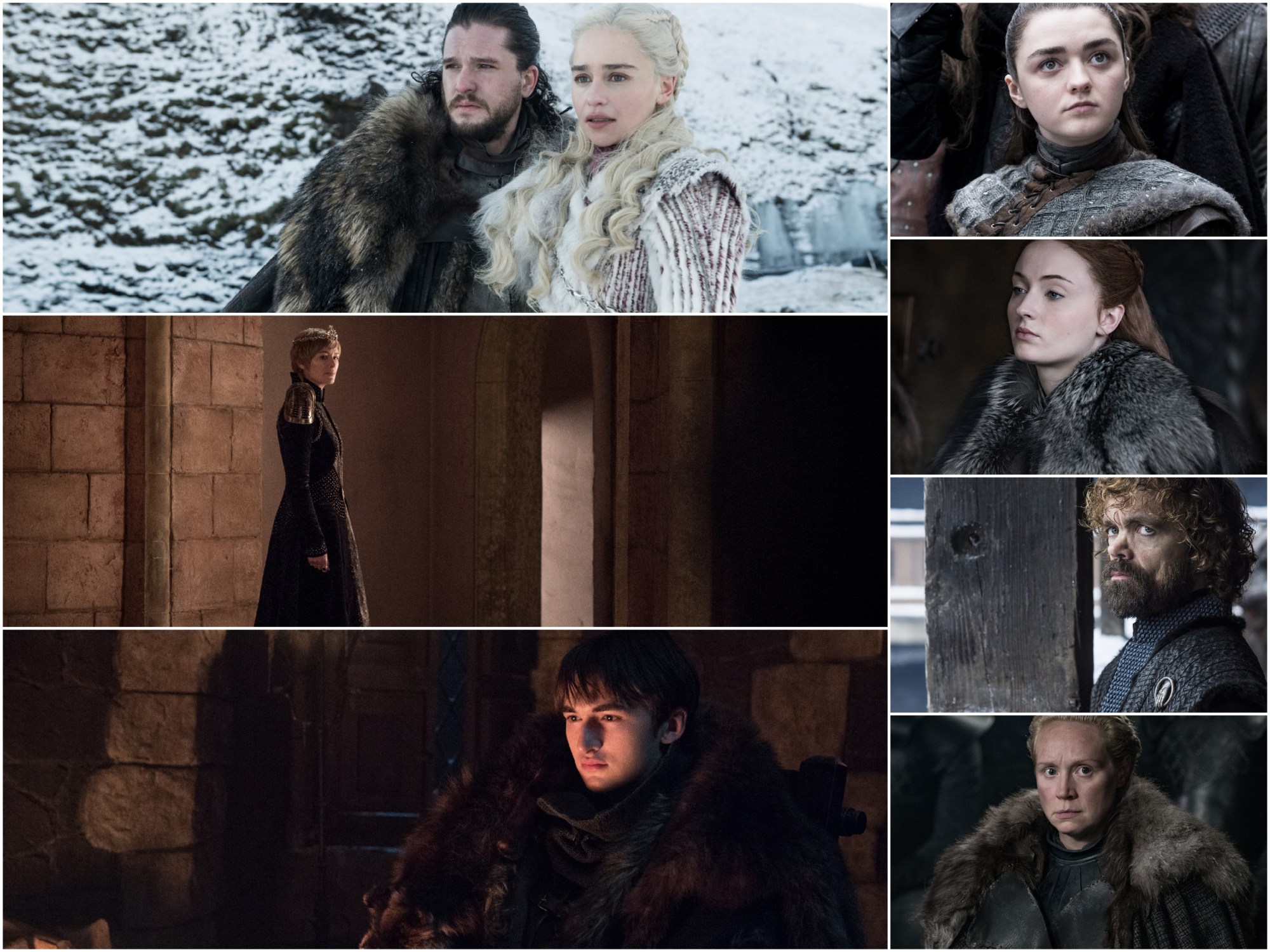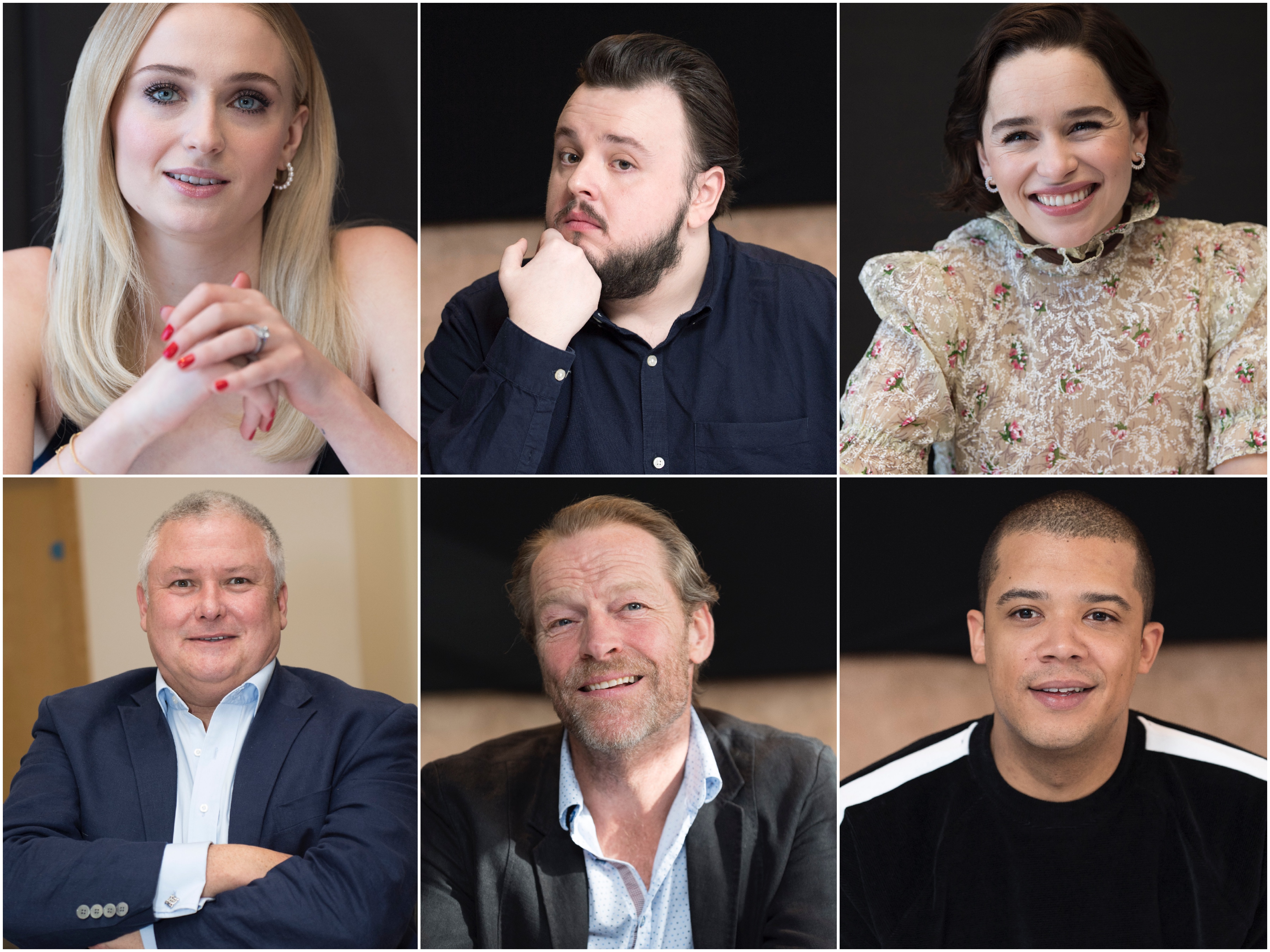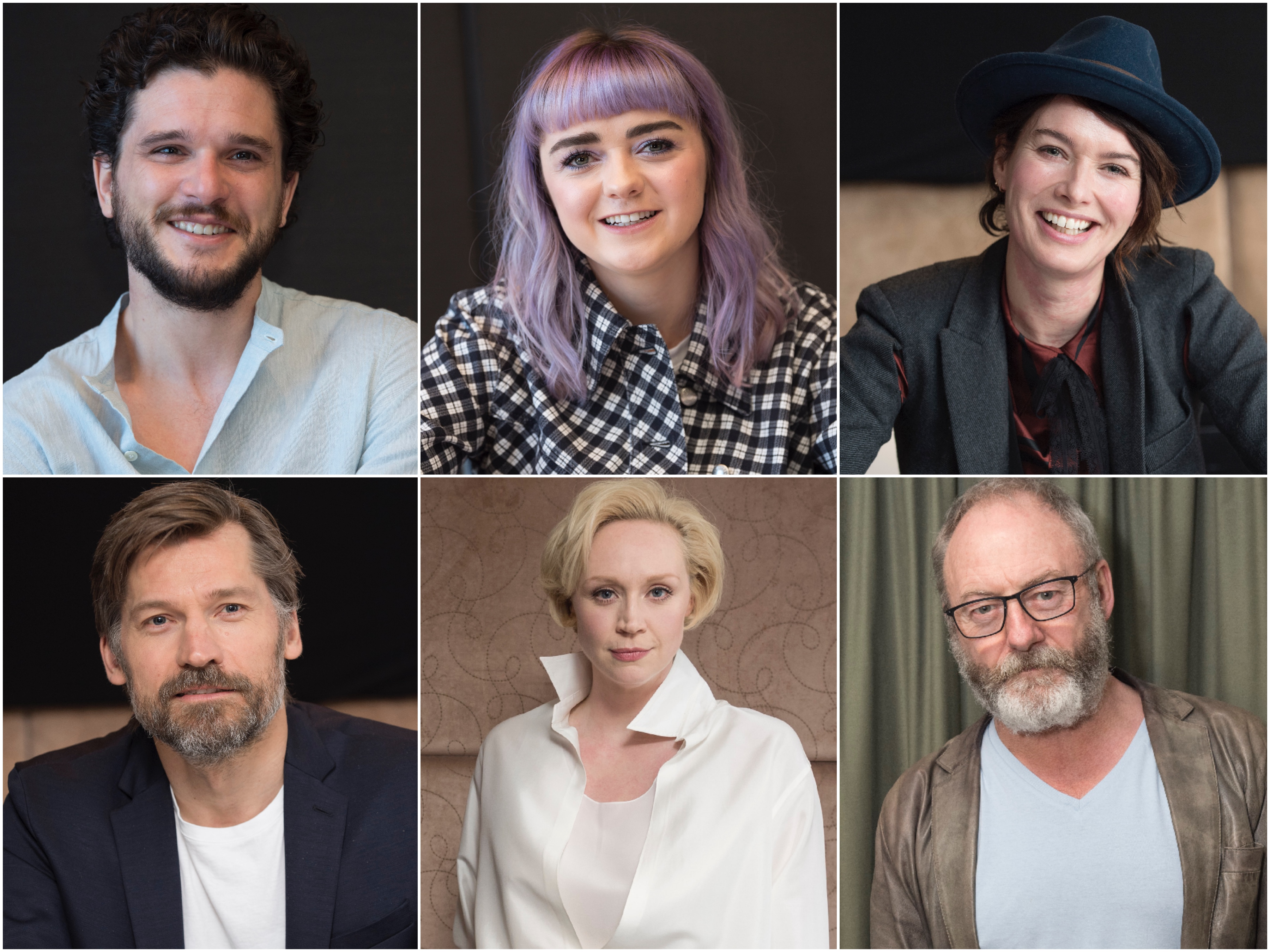
- Television
An Oral History of Game of Thrones, Part IV: The End of It
As the sprawling saga created by author George R.R. Martin and brought to screens worldwide by writer/producers David Benioff and D. B. Weiss comes to a close with its final, eighth season, nothing better than to go back to the beginning.
The journey of the iconic series is spread out over ten years and eight seasons, which the HFPA has followed very closely. From unknown quantity to HBO’s most successful series ever -spectacular viewership worldwide, six Golden Globe nominations and one win, for Peter Dinklage, best supporting actor/TV- Game of Thrones established a new benchmark in TV production and put the fantasy genre right on the forefront.
As we say goodbye to Westeros and Essos, we look back at the series through the eyes of its creators and actors and what they told us in dozens of interviews.
In the fourth and final installment of this four-part feature, the saga comes to a close, cast and creators recall a decade of work, challenges, and friendships – and say goodbye to an exciting time.
Belfast, 2018-New York, 2019
David Benioff, series creator/executive producer: I think it’s bittersweet. We had the table read, the final table read with the entire cast right here at this table, and it’s strange thinking back to the Pilot when we did it nine years ago now. And so many of the original cast has been killed off and they are not there anymore. Thanks to us. George gets some of the blame as well. And the ones who survived it have grown. We cast three children in Sophie, Maisie, and Isaac and they are now three adults and have grown into incredible actors. And it was thrilling on the one hand and also very sad when we finished the final script because it has become a family.
Kit Harington, Jon Snow: I kind of think of myself as quite a cynical realistic unbothered English man and it was in this room that we did the read-through for the final season and I chose not to read the episodes until we were in the room with everyone and I was really… I found it quite an emotional punch to the gut. Not just what happens generally but just kind of reading the final lines of this… the end of it.
Iain Glen, Jorah Mormont: it’s been an incredible rollercoaster journey. And I love each season coming back, getting into my trailer and putting on those smelly old worn clothes. I just think this is such an odd thing to do as an actor and it reminds me how special it is each time.
Gwendoline Christie, Brienne of Tarth: At the table read most people did cry because it’s the end of something that’s been a huge part of our lives. I really don’t say that lightly. It has changed so many aspects of all of our lives, truly. And it will continue to define us.
Emilia Clarke, Daenerys Targaryen: The real goodbye happened on set, the real goodbye happened 10 times on set, with all of the different parties, when a different cast member would have their final scene then we would throw a big party.
Sophie Turner, Sansa Stark: I didn’t cry (at the final season premiere) which I was kind of half expecting to. I don’t think I fully realize that it’s over. I didn’t say any goodbyes to anyone (at the premiere), I think because it’s too painful, so I will probably just text them at some point and say bye-bye. It doesn’t feel like it’s over yet, I think once Summer rolls around and we are not in Belfast again, I think that’s when it’s going to hit me.
David Benioff: We were nervous that we were catching up to (George R. R. Martin’s books) and we wanted to know some more information from him about where the series was going. So, we went to Santa Fe and spent a week with George. And what George always says is that there are two kinds of writers, the gardeners, and the architects. And the architects, they plan everything out and they have a very detailed outline showing exactly where they are going, and the gardeners plant seeds and kind of watch to see how things grow. And he is very much a gardener, which means that he doesn’t have the entire thing planned out from the beginning. One thing that we realized was that we were going to catch up to (George R.R. Martin) pretty quickly and we had to figure out for ourselves a lot of stuff that was going on. But he did give us some very crucial pointers in terms of the endgame.
Isaac Hempstead Wright, Bran Stark: I met George Martin when I was 10 and at the point, it was sort of “Hello and thanks for letting me be in your show” and I really didn’t have any great in-depth conversations about the politics and sex and murder of Westeros. I haven’t seen George R.R. Martin a couple of years but the last time I met him I remember going to him and saying ‘you know what happens to Bran next? I look forward to the next time I get to see him because I’ve got a lot of questions about the magic of Westeros.

(top) Sophie Turner, John Bradley, Emilia Clarke; (bottom) Conleth Hill,Iain Glenn, and Jacob Anderson.
hfpa
Nikolaj Coster-Waldau, Jaime Lannister: (Game of Thrones is) based on history. It’s part of our history, right? The War of the Roses. The thing is, we don’t seem to learn that much from history. We would like to think of ourselves as this very evolved species, but we keep repeating our mistakes and make these horrible decisions. But I think that the fact that this show is not directly linked to one era, but it’s set in this parallel universe, it’s one of the reasons that it’s so accessible to everyone.
David Benioff: This cast, it’s one of the largest casts in the history of television and movies and it’s just one of the largest casts ever. And, by and large, I think it’s been just a remarkable array of talent. And deeply proud of the incredible actors that we brought together and also the fact that everyone gets along.
Emilia Clarke: Daenerys has given me a huge amount of confidence, partly because we’re acting but when you have to stand up in front of 800 extras and say a fake language and try and convince them through the intonations of your voice that what you’re saying is empowering and there’s something in it and something that they can follow, you’ve got to grow some balls to do that.
Lena Headey, Cersei Lannister: I think in the beginning Cersei was sort of very two dimensional to people and they were like she’s just the bad guy, but I think because she’s survived eight years of Westeros…it’s interesting listening to people talk about her with everything I put into her. I like it when people kind of get there are layers of vulnerability She’s highly duplicitous and ferocious in her desire to survive all of this. So, I’ve made her multi-layered because as an actor that’s more interesting for me.
Isaac Hempstead Wright: There are a few characters in Game of Thrones like (Bran) whose weapons aren’t their swords or their axes, but really their wits. I don’t think I would have Bran’s journey any other way, even that was quite a slow burn for many seasons where there wasn’t necessarily a lot going on. I thought it was nice because it set up the fact that Bran had a higher purpose.
Gwendoline Christie: Over the years I was very surprised at the response to Brienne of Tarth. I didn’t know that there was room in our media and our society for an unconventional woman like that to be celebrated. Because she’s a female character that is described as being ugly, whatever that means, as being larger than average, of being unusually strong, of being incredibly skilled at sword fighting. and isn’t cute or sexy or have any of the conventional attributes that women are supposed to have in order to be appealing. But what I found particularly beautiful about the character is her real vulnerability. And I knew that if I watched that show and having read those books, I identified part of myself in her and I felt recognized, I felt seen.
Maisie Williams, Arya Stark: Some of the defining moments for Arya were a lot of this season. But I also found myself thinking back and finding parallels between the final season and the first season. There are definitely moments in the first season, the beheading of Ned Stark and leaving Sansa, that have really influenced a lot of Arya’s decisions in this series.

(top) Kit Harington, Maisie Williams, Lena Headey; (bottom) Nikolaj Coster-Waldau, Gwendoline Christie and Liam Cunningham.
hfpa
Sophie Turner: My first audition, I did it at my school. I remember auditioning with a bunch of friends from my class and we weren’t taking it seriously, we were just messing around. I don’t really remember much from Season One or the Pilot anyway. I think I just was so swept up in the magic of it, I remember being in complete awe of the kind of intricacies of making this thing work. all I remember is Sean Bean in the corner reading Game of Thrones on the set of Game of Thrones.
Conleth Hill, Lord Varys: I have to be very honest I resisted Game of Thrones so much when it first was put to me because like everyone else who hadn’t read the books we knew nothing about it, and I just kept saying to my agent I’m not into dragons and swords and sorcery. So eventually David and Dan were in Belfast and he said, look they’re in Belfast just go meet them. I’ve only met George a few times and I’ve always found him an animating character. And I just see him as a fellow Catholic, he may be lapsed now or whatever, but I see so much of that in his work in terms of the moral and taking the black and all those kinds of things
Kit Harington: One of my favorite sets, although I’ve never spent any time on it, is the Throne Room. Every time you walk into the Throne Room and it’s just iconic now. And Castle Black- that’s another one that you’ve seen so much of it. It’s great to actually walk into it – you realize that obviously there’s nothing CGI about it. It’s all there.
John Bradley, Samwell Tarly:(My favorite set) would definitely be the place just outside Girona in Spain where we shot all the Horn Hill stuff. We shot the House Tarly. We shot the awful dinner they had where Randyll Tarly just destroys Samwell. And the thing I found to be most interesting about that was, Sam’s father and Sam’s home life and that dynamic is something that’s affected him all the way through. He’s always carrying around those memories and that hurt and that pain.
Nikolaj Coster-Waldau : (My favorite scene) was last year with the sequence where you’ve got 40 riders standing on the horses, galloping, jumping and then you have 21 stunt guys on fire at the same time, you have wagons riding with horses, on fire. That’s so dangerous and so difficult and it’s so inspiring to be part of. And because most of the movies you see on this scale a lot of that would be CGI. And what they’ve done here is we have the sets that are built up, most things that you see are real. It’s an in-camera action.
Isaac Hempstead Wright: One of the biggest moments (for me) when I was on set was getting to that scene in season six where Bran is walking through the army of the dead and the Night King grabs on to him. That was like I’m walking through a hundred zombies and there are these ice creatures like staring at me looking super menacing on their horses cause all prosthetics pretty much that’s not some guy in a green suit, so they look fearlessly frightening. I’ve got a great selfie with the Night King.
Lena Headey: The throne is really uncomfy, so that’s not my favorite. I just like if there’s Cersei… You know everyone’s bedroom (set) because there’s always a comfy bed that you have to lie really carefully on because the props guys are like, “Oh, come on I just made it”. They’re really gentle.
John Bradley: The thing about actors is, they’re ruthlessly competitive. In quite a goodhearted way but it’s all about competition, it’s all about puzzles and quizzes and who can come out on top. We used to play a game where we’d have somebody with a laptop and we had to start playing songs, and it’s the first person to get what song it was from the intro before they started singing, and that could on long night shoots when you’ve got hours to kill, that can be invaluable. Especially if you’re playing a scene where you really despise the person you’re talking to.
Maisie Williams: What I’ll miss the least is the wet feet, that was the worst thing. Because I have really bad circulation in my ankles so there were these waterproof socks that you can wear but they would hold my foot too tight and you have got a dry foot, but you can’t feel it because it is too numb.
Gwendoline Christie: My most difficult scene was fighting the bear. Which is not something I thought I’d ever say. We were brought over to Los Angeles to shoot that scene. I really wanted to see the bear. And they were getting the bear out to walk around the bear pit that they’d constructed. So I’m sitting in this chair and the trainer’s doors are open. And you hear Bart The Bear, and the country and western music is playing because that’s what Bart likes, it soothes him. And suddenly I saw one paw go down and then the next paw come down and then Bart climbed out of his trailer and then stopped and turned around and stared dead at me and would not move. And I thought he wants to eat me. But that was such an incredible experience.
Maisie Williams: I am thrilled that Arya has made it this far. It’s strange, there is a sort of nervousness about where your character is going to go, but with this show, I feel like as shocking as it is, the way that these death scenes come about makes so much sense and it’s plotted out so well!
David Benioff: Traditionally, there would be the death call where (co-creator and producer) Dan (D.B. Weiss) and I would call up the actors and it would always be really nervous for them because they kind of knew. Like if we are calling a few months before they get the scripts, they kind of knew why we were calling. And we would explain to them that you have been great and all, but your time has come. This season, because so many of them die, we decided to wait until they got the scripts.
Nikolaj Coster Waldau: I think for us but also for anyone who’s followed the show, we all know it doesn’t happen that often that a show catches fire like this, it’s an extreme experience and one that I’m very grateful for.
Kit Harington: I’ve never been in this kind of emotional journey like it in anything I’ve done and that I feel that some of me is like leaving school, is the closest thing I can feel to it. (…) everyone was in this room for it and there were cameras filming it for the documentary, posterity. David and Dan said they were looking at me to see what my reactions were through it and said they were kind of priceless, so I hope that… but yeah, we had tears at the end pretty much. There was a standing ovation at the end and there were tears and I broke down. I just started sobbing and there were a lot of people that were exactly the same. I don’t know what it was, it was just… just a fact, just reading the words because every year we read “end of season five, end of season six” and this just said “end of Game of Thrones”.

